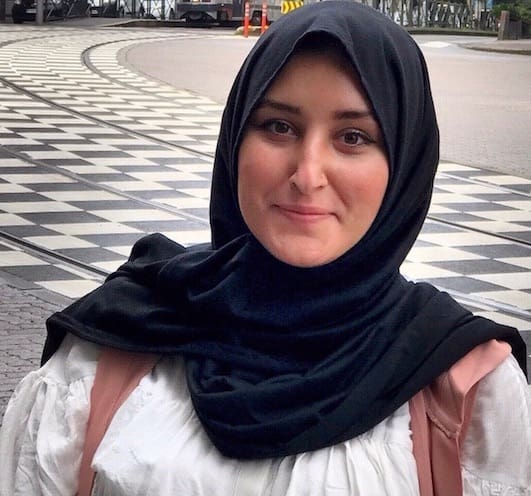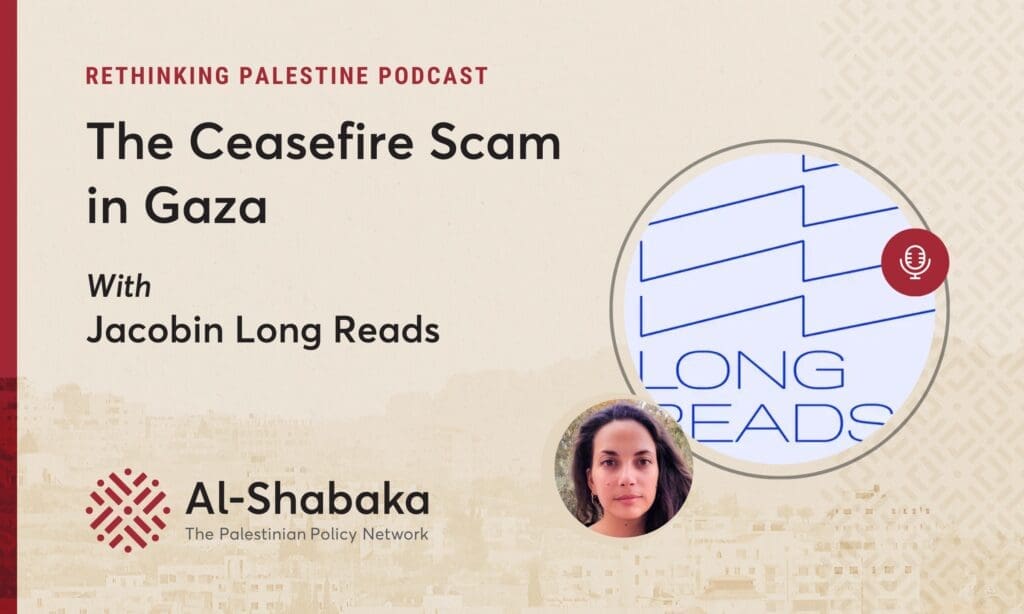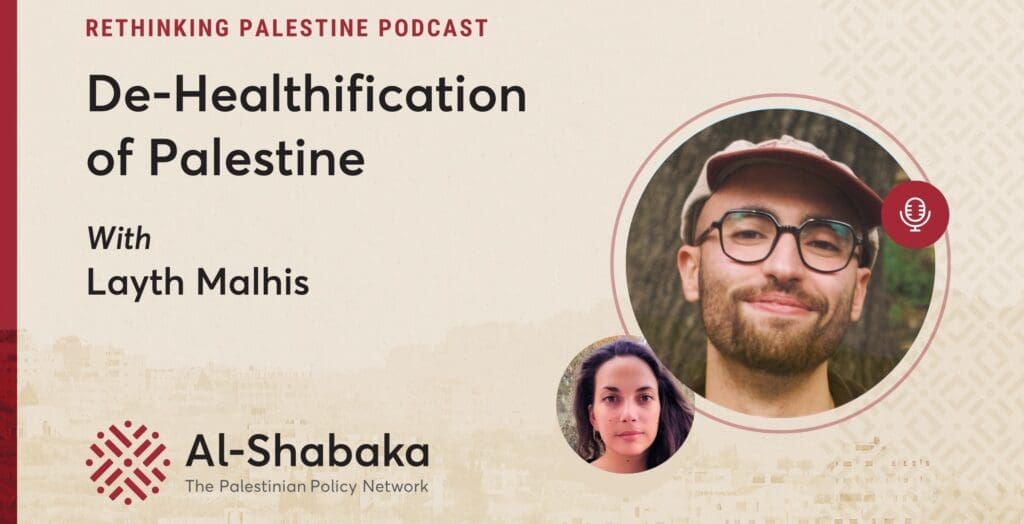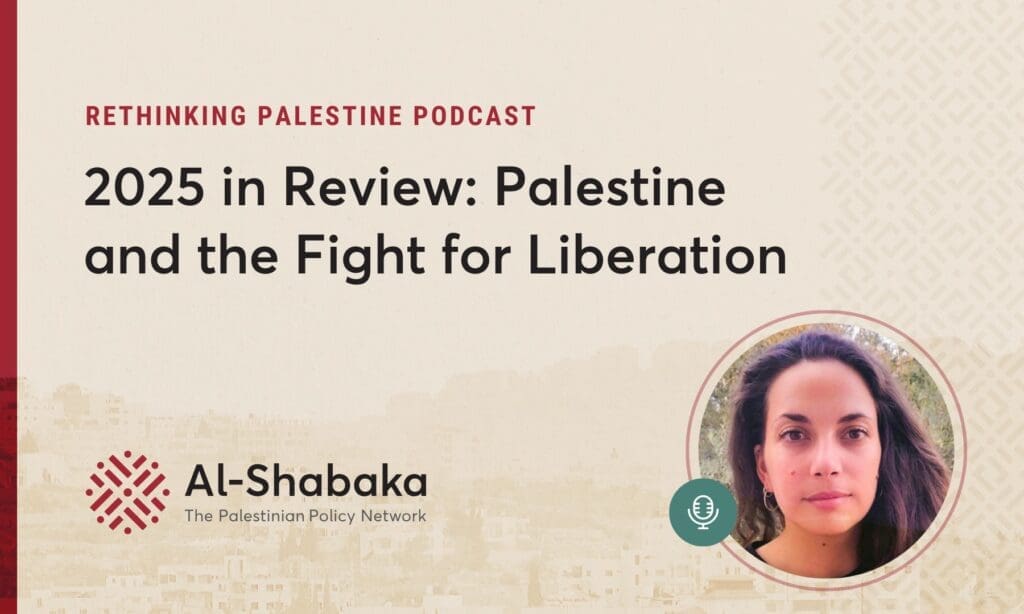About This Episode
Episode Transcript
The transcript below has been lightly edited for brevity and clarity.
Asmaa Abu Mezied 0:00
So what the international community ends up doing is really providing Palestinians with painkillers and very short-term solutions, rather than addressing the big elephant in the room, rather than addressing the root causes, which is the role of the Israeli regime in perpetuating and maintaining an energy crisis.
Yara Hawari 0:25
From Al-Shabaka, the Palestinian Policy Network, I am Yara Hawari, and this is Rethinking Palestine.
The siege imposed on Gaza by the Israeli regime has made the strip unlivable in more ways than one. The worsening energy crisis in particular is affecting all areas of life. Indeed, since the imposition of the siege on Gaza in 2006, the Israeli regime has limited energy access and has even used it as a tool to collectively punish those living in Gaza.
This, in addition to the destruction of energy-producing infrastructure by successive Israeli bombing campaigns, has led to acute energy poverty. Of course, as ever, Palestinians have attempted to manage this unmanageable situation, finding alternatives and navigating these extreme living conditions, one of which is harnessing solar power to supplement the dwindling energy supply.
But these alternative forms of energy come at a price and can even be used by the international donor community as a way to sidestep their responsibility in holding the Israeli regime to account for the siege of Gaza and colonization of Palestine. Joining us to discuss this is our Gaza visiting fellow and energy researcher, Asmaa Abu Mezied.
Asmaa, thank you so much for joining us on Rethinking Palestine.
Asmaa Abu Mezied 1:44
Thank you for hosting me here.
Yara Hawari 1:47
Asmaa, perhaps you can start us off by giving us an overview of the energy situation in Gaza and perhaps even in wider Palestine.
Asmaa Abu Mezied 1:56
I think it’s extremely important to understand the energy situation in Gaza by looking at the broader picture, by really looking and analyzing and reflecting on the overall energy situation in Palestine, and seeing how the Israeli regime’s policies have been going for decades to control Palestinians, including in the energy space.
The energy crisis is not something very recent. It’s not something that is happening only in the past two decades. It actually has been going on for several decades so far — since the Palestinian dependence on the Israeli regime for electricity supply from the Israeli electricity company in the 70s and the 80s, until of course the 1994 Paris Economic Protocol, that really conditioned Palestinian imports of fuel to specific standards, usually the US and European standards. Which makes it extremely and economically impossible for Palestinians to buy from other places than the Israeli regime.
And therefore, it already comes to a point where Palestinians, regardless of where they are, whether in Gaza or in the West Bank, end up paying so much for electricity that they use the least of in the region.
And what happens is that we see a huge dependency on imports of electricity from Israel. So if we want to look at Palestinians in general, 83% of the electricity supply comes from the Israeli regime. For Gaza specifically, electricity supplies come from several sources. One of them is the Palestinian Electricity Company, and of course from the electricity line from the Israeli regime.
Now, there has been a point in the past two decades when electricity supply used to come from Egypt, but the capacity was very, very minimum. Now, it’s important also to highlight that the electricity supply that comes into Gaza can barely cover 40% of the electricity demands, particularly after the destruction of the diesel power plants in 2014 by the Israeli regime.
In summary, what we are seeing in Gaza is a very chronic electricity crisis that has been exasperated over the past two decades due to the bombardment of the power plant, due to the restriction and the manipulation of fuel entry to Gaza as part of political pressure. But even looking in the future, with the increasing population, that electricity crisis will continue to exasperate, it’ll continue to widen, if we want to look at what the electricity sources are and what’s the demand currently.
Yara Hawari 4:50
So, Asmaa, what does this mean for day-to-day life in Gaza? What does it affect?
Asmaa Abu Mezied 4:56
If you want to look at the effect of the electricity crisis on Gaza, one has to understand energy poverty. And what I mean by energy poverty is really the extent to which the electricity bill, for example, constitutes or eats from the household income, and the extent to which households end up minimizing their electricity consumption in a way that affects their wellbeing and their welfare.
And this is something that happens in almost every Palestinian household in Gaza, but also in Area C in the West Bank. Now, what does it mean? It means that the electricity crisis that we are seeing and experiencing is really crippling almost every aspect of life in Gaza.
If we look at areas such as wastewater treatment and the need for a constant supply of electricity in order for plants to treat partially or completely the wastewater, so that at least we have clean access to the Mediterranean Sea — and that’s not something that happens with the electricity cut.
If we look at access to healthcare, the fact that there are electricity cuts happening in hospitals and clinics, that really affects the quality of healthcare services provided. Treatment gets delayed for a very long time depending on the availability of electricity to do, for example, X-rays, and so on.
And most importantly, the increase in the daily cost incurred by Palestinians when it comes to electricity. If you look at the Palestinian household in Gaza, an average income is about $340. And that’s not mentioning people who work in the informal sector, not mentioning people who work in really precarious working conditions. And looking at the electricity bill, it constitutes about $40 to $80. And that amount is not for getting electricity for 24 hours. It’s only for getting electricity for almost 12 hours, a maximum of 16 hours.
So it means that one-fifth of the Palestinian household income is going to electricity. And it puts families who are below the poverty line in so many dire circumstances that they have to resort to other alternatives in order to pass by the day and meet their needs on a daily basis.
Yara Hawari 7:34
Now, Asmaa, you’ve written about all of this in a recent policy brief for Al-Shabaka, and in one part of the brief, you focus on how women are disproportionately affected by this energy crisis. Can you tell us a bit more about this?
Asmaa Abu Mezied 7:50
Usually, when analysis is being done, it treats the Palestinian community as one community without delving deeper into the needs of different stakeholders that exist — women, people with disability, children, and so on. And in my opinion, the energy poverty that is resulting from the energy crisis has extreme circumstances and results affecting women in a very different way.
If we look at the reality of Palestinian women, we find that Palestinian women are responsible for all the unpaid care and domestic work — that is cooking, cleaning, teaching children at home, taking care of the sick and the elderly, taking care of the children. And electricity is a very vital part of doing that unpaid care and domestic work.
So what we see when electricity is off in Gaza over the past two decades is that women have two options. The first option is that they intensify the labor in a very limited time when electricity is on. And I’ll give you an example of that. In times when the electricity comes for six hours, women end up doing everything that needs to be done using electricity in those six hours — baking, doing the cleaning, doing the washing, and teaching the children if it’s connected to online education. So it’s a very intense labor where women end up doing so many tasks at the same time so that they can do all the unpaid care and domestic work.
The other option is that when electricity is off, women tend to resort to technology-free labor — utilizing things that do not necessarily need electricity. And that would mean taking longer time in doing things. For example, when there is no electricity, women cannot use the washing machine, so they end up washing the clothes manually. And that usually takes two to three hours. Or even baking bread — if they want to bake bread without having electricity, they will have to use wood-fuel ovens. So that also results in a longer period of work for them, but also health hazards and long-term health diseases in the long run.
So if we really want to understand the manifestation of the electricity crisis and energy poverty, we need to look at these small details, because it might sound small, but it takes up so much of women’s time, it takes up so much of their health. And also, women have so much mental burden associated with the electricity cuts.
And the example of how women have so much mental burden is usually happening in the summer, when there is very high heat. Food spoilage is usually very high when there is no electricity, and women end up having to cook every meal every day instead of cooking for a longer period of time. Or having to navigate that heat, taking care of the children who get skin-borne disease, and also managing the household. So all of that really affects the welfare of the family in general.
Yara Hawari 11:10
If you’re enjoying this podcast, please visit our website, al-shabaka.org, where you’ll find more Palestinian policy analysis, and where you can join our mailing list and donate to support our work.
Asmaa, you are right in insisting on an intersectional-based approach to this energy crisis, because it really shows us how the energy crisis exasperates already existing patriarchal structures and also class structures. Could you tell us maybe a little bit more about how class dynamics manifest themselves in this energy crisis?
Asmaa Abu Mezied 11:44
When we look at energy and access to energy, we need to think about two things: access and affordability. And looking at the socioeconomic context of the Palestinian community in Gaza, you’ll see that over 60 to 70% of the population is living in poverty, and 80% are depending on humanitarian aid.
So that means that even if there are solutions that can lessen or reduce the energy crisis, the ability of a Palestinian household to utilize these solutions, to incur some improvement in their daily life, is very, very limited. But it also means that, for example, workers are less likely to be able to have work safety and work security within the factories in which they work.
An acute example of that: the electricity issue has resulted in shifts in the working hours, which has resulted in reducing the working hours in most of the factories. Now, those factory workers have lost their income, which has caused a reduction in their salaries because the working hours have been reduced. So they end up having less security. Some of them get laid off from their work and also have less monthly income in their household — due to a structural issue that was initiated and exasperated by the Israeli regime.
And that shows who bears the burden of being under occupation: it is usually the Palestinian household, rather than actually holding accountable those who contributed to the electricity and energy crisis.
Yara Hawari 13:26
Asmaa, you mentioned a really stark statistic that nearly 80% of the population in Gaza depends on international aid in some way. Does this donor aid actually alleviate some of the issues caused by the energy crisis?
Asmaa Abu Mezied 13:42
In terms of alleviating some, yes, it does. If we want to look at the donor aid over the past two decades, we see examples where donors like the European Union have provided fuel to the Gaza electricity plants. We see also examples of Qatar and Turkey covering the fuel bill and ensuring that there is enough diesel to supply the running of the Gaza Electricity Company. And we also see some aid money going into the health sector, the education sector, and even the wastewater facilities to install some solar energy projects.
But if you really want to look at all of these solutions that were provided, they were part of coping with the electricity cuts — kind of normalizing the status quo and helping people to be okay and navigate the status quo, rather than challenging the root causes of why the electricity crisis happens, or why the energy crisis actually exists in Gaza.
So there have been solutions, again, even provided for small businesses where some grants are provided to install solar energy, and even for farmers. But even in these solutions, there is a lack of any will to change the status quo, to challenge the role of the Israeli regime in maintaining this status quo. And there are also patriarchal norms in terms of how this aid is being implemented.
Yara Hawari 15:20
Can you give us an example of some of those patriarchal norms that you mentioned?
Asmaa Abu Mezied 15:25
If we look at most of the aid that goes into the installation of solar energy systems in Gaza, in the requirement to benefit from grants, from cost sharing, and even from access to specific solutions, we will notice several criteria. One of them is having a small business that is usually, for example, registered, or having land if you are providing solar systems for farmers who own water wells, having an ownership deed for the land, or having a guarantor who can support your application if you want to get a loan.
If you look at these criteria, they are completely blind to the status of women in Palestine in terms of access to inheritance and access to ownership, but also in terms of owning businesses. So if you really analyze these criteria, it means that only those who are more well-off compared to the rest of the population can benefit from these.
What happens is that we end up enabling those who have more privilege than those who are with the least privilege existing. Again, just looking at all these criteria for these projects, it shows you. Now, it’s important to note that yes, there is always a quota at the end of the application that says that we encourage women’s participation. But then, if the criteria that are put there as part of the conditions are already biased, how is it possible that we are encouraging women’s participation?
Yara Hawari 17:13
So in this way, the international community is often complicit in the perpetuation of this energy poverty, but also complicit in the upholding of current power structures in Palestinian society.
Asmaa Abu Mezied 17:26
Yes, totally. Donors treat the energy crisis in Palestine as a humanitarian or a development issue. So by preparing Palestinians with capacity building, technical capacity building, by investing in technology-related solutions, by investing in solar power, for example, Palestinians supposedly should be able to solve the issue or lessen the amount of energy crisis that they have. And this is a very depoliticized view of an issue that is very political at its core.
The issue with electricity and the energy crisis is very political, because in order to have energy security and energy independence, you need to have control and sovereignty over your natural resources, so that you can work around coming up with solutions that are benefiting the Palestinian community. But the whole structure in which Palestinians are living — they do not have any control over their natural resources, because the Israeli regime is controlling these natural resources.
So what the international community ends up doing is really providing Palestinians with painkillers and very short-term solutions, rather than addressing the big elephant in the room, rather than addressing the root causes, which is the role of the Israeli regime in perpetuating and maintaining the energy crisis.
So any solution, if we want to talk about sustainable solutions, really needs to challenge the role of the Israeli regime, and it also needs to hold them accountable for all the challenges that Palestinians face. And I’ll just give an example of Palestinians in Area C, where they need to have permits to establish any solar energy system. Usually, they get denied these permits. But even in donor-supported projects that established solar panels, these solar panels are being destroyed, and there is no accountability for the Israeli regime for destroying these infrastructures that have been paid for by the international community.
Yara Hawari 19:41
Asmaa, you touched upon this briefly, but I was hoping that you could tell us a bit more about the coping mechanisms or techniques that Palestinians in Gaza are using to navigate this energy crisis.
Asmaa Abu Mezied 19:53
So historically, Palestinians in Gaza have really adopted several techniques to address the electricity and energy crisis. Starting from the early days of the siege in 2007, where there have been fuel cutoffs and people had to use cooking oil for cars as an alternative for fuel. Then, with the electricity crisis, how people have used candles. Then they shifted into using private electricity generators, and then solar energy systems. And now people are also using private engines that are part of the commercial private sector to get electricity.
Now, what happens is that Palestinians really end up deploying several techniques at the same time to obtain electricity. And each technique has its own cost, has its own accessibility, and so on. But what’s important, and what people do not usually talk about, is what’s the cost that households incur beyond the money aspect.
What happens is that Palestinians are forced to normalize their life as it is, the status quo as it is, and are forced to find solutions by themselves, as if the problem has been created by Palestinians and therefore it’s their responsibility to find solutions for it. And what happens is that those who are not coping are kind of entitled as, or titled as, “nonresilient” or “failed to be a successful innovator.” That’s a very problematic narrative, and this is a narrative even we see in the media, with most of the success stories and projects that we see.
And to be honest, Yara, to me, the word “resilience” is a word I really hate. I think resilience is about telling Palestinians that they need to normalize the status quo, that they need to be okay for not getting 24 hours of electricity, for having their basic rights violated every single day. And those who navigate that the most are those who we should celebrate as success stories, as entrepreneurs, and so on.
And the individualization of success stories puts a narrative that those who did not succeed within these conditions are failures, and shies away from the core root of the problem — that this is a structural issue. It’s structural oppression that is limiting Palestinian lives, rather than an individual issue for those who were able to navigate things and for those who didn’t.
Yara Hawari 22:45
Asmaa, I couldn’t agree with you more. Palestinians don’t want to be resilient. They want to be free. And this focus on resilience and, as you said, these independent success stories, are actually not only detrimental to the Palestinian struggle for freedom, but they’re deliberately attempting to cover up the complicity of the international community and really the lack of political will to change the structural issue, which of course is the Israeli occupation, the Israeli colonization of Palestine. Asmaa, thank you so much for joining me on this episode of Rethinking Palestine.
Asmaa Abu Mezied 23:21
Thank you so much, Yara. Thank you.
Yara Hawari 23:26
Rethinking Palestine is brought to you by Al-Shabaka, the Palestinian Policy Network. Al-Shabaka is the only global, independent Palestinian think tank, whose mission is to produce critical policy analysis and collectively imagine a new policymaking paradigm for Palestine and Palestinians worldwide. For more information or to donate to support our work, visit al-shabaka.org, and importantly, don’t forget to subscribe to Rethinking Palestine wherever you listen to podcasts.
Asmaa Abu Mezied is an economic development and social inclusion specialist working with Oxfam to address issues of gender, development, and climate change in the agriculture sector. Her research interests focus on the care economy, women’s collectives organizing in economic sectors, the private sector’s social accountability, and the intersection of Palestinian political, agricultural, and environmental identities. She served as Al-Shabaka’s 2022 Visiting Gaza Fellow and was previously an Atlas Corps Fellow in partnership with President Obama Emerging Global Leaders, a Gaza Hub-Global Shaper (an initiative of World Economic Forum), and a 2021 Mozilla Foundation Wrangler at “Tech for Social Activism” space.
Al-Shabaka: The Palestinian Policy Network is an independent, non-partisan, and non-profit organization whose mission is to convene a multidisciplinary, global network of Palestinian analysts to produce critical policy analysis and collectively imagine a new policymaking paradigm for Palestine and Palestinians worldwide.


















